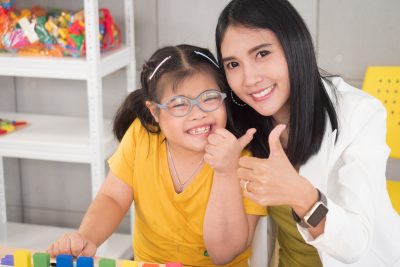Getting the right help for students with disabilities is made easier when families learn key vocabulary and understand how to use it. PAVE provides videos to support learning about student rights and how to work with the school to get individualized support.
Video number 1: Pyramid of Rights Protections for Students With Disabilities
The first video provides a visual to help—a pyramid of student rights. Learn about special education rights, civil rights, and general education rights. Students with Individualized Education Programs (IEPs) are protected by the full pyramid of rights. Students with IEPs and Section 504 Plans have civil rights that protect their right to be accommodated and supported at school. All children in the United States have the right to access a free public education. Learn key terms from these rights: Free Appropriate Public Education (FAPE), equity, and access, and how to use those words to help a student get their needs met.
Here are resource links referenced in the video:
- OSPI homeless student resources, with information about protections through McKinney-Vento
- PAVE article: Bullying at School: Resources and the Rights of Students with Special Needs
- US Department of Education Office for Civil Rights July 2022 guidance: Supporting Students with Disabilities and Avoiding the Discriminatory Use of Student Discipline under Section 504 of the Rehabilitation Act of 1973
- PAVE article: What Parents Need to Know when Disability Impacts Behavior and Discipline at School
- PAVE article: Section 504: A Plan for Equity, Access and Accommodations
- OSPI page to download, in multiple languages, a booklet of Procedural Safeguards
The video mentions that a civil rights complaint can be filed at the local, state, or federal level and may include elements of more than one civil rights protected area, such as disability discrimination, racism, and/or sexual discrimination. Here are resources with more information about civil rights complaint options and how to access forms:
- Local: OSPI maintains a list of school officials responsible for upholding student civil rights. Families can reach out to those personnel to request a complaint form for filing a civil rights complaint within their district.
- State: OSPI provides a website page with direct links to step-by-step instructions for filing a civil rights complaint with the state Equity and Civil Rights Office, or the Human Rights Commission.
- Federal: The U.S. Department of Education provides guidance about filing a federal complaint. The U.S. Department of Agriculture is another option for dispute resolution related to civil rights.
The video provides information about some special education dispute resolution options. Here are related resources:
- Sound Options Group: agency families in Washington State can contact to request a Mediation or Facilitated IEP process with the school
- PAVE video: Procedural Safeguards: How to File a Special Education Complaint
- OSPI Q&A about filing a Community Complaint, with links to download the complaint form in multiple languages
- OSPI information about Due Process, with a legal assistance list
The Youth Education Law Collaborative offers some free legal assistance on topics related to educational equity, with a priority for students and their families who demonstrate financial need. They can be reached by telephone at 1-206-707-0877 or 1-844-435-7676.
Video number 2: Accommodations and Modifications
Our second video shares more detail about the rights of students under Section 504 of the Rehabilitation Act. Key to protecting those rights is the accommodations, modifications, and supports that enable a student with a disability to access what typically developing students can access without support. Non-discriminatory practices related to bullying, student discipline, and attendance are protected rights. Click on the video to learn more about what the right to equity means.
Here are resource links related to this video:
- PAVE video: Supporting literacy: Text-to-Speech and IEP goal setting for students with learning disabilities
- OSPI Sample 504 Plan, in Word document format
- Printable OSPI handout (5-pages): Students’ Rights: Section 504 and Students with Disabilities
PAVE article: Section 504: A Plan for Equity, Access and Accommodations
Video number 3: IEP Goal Setting
Our third video provides more detail about the rights of a student with an IEP. A three-step process is provided to help family caregivers make sure a student’s IEP goals are supporting the right help in the right way. Learn about Present Levels of Performance (PLOP), Specially Designed Instruction (SDI), and SMART goals to become a well-trained partner in the IEP team process. PAVE provides a fillable worksheet to assist parents in developing suggestions to share with the IEP team.
To get help from PAVE’s Parent Training and Information staff, click Get Help to complete an online Help Request Form.
We’d love to know whether these trainings are helpful. Please share your feedback by completing a short survey.
For more trainings and events, check out your options on the PAVE Calendar.

